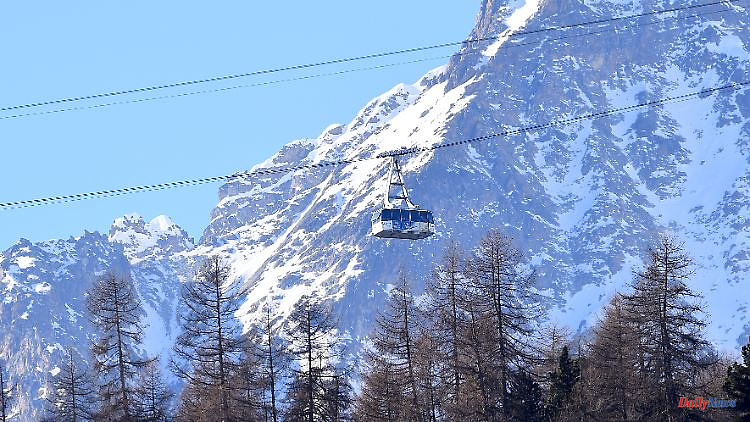In the corona pandemic, the outdoor industry is one of the winners of the crisis - but winter sports in particular are expensive. Inflation is currently forcing many people to keep a close eye on their spending. The industry expects strong losses - with one exception.
The winter sports industry from hoteliers to sports shops is being plagued by uncertainty ahead of the start of next season due to high inflation. The questions: Will the need for fun in the snow be so great that customers will accept the high price increases? Early indications are that average earners may cut back, but higher earners will not. This is what the feedback on the booking situation in the hotels suggests.
"We have a fairly diffuse picture, the winter season is very difficult to predict," says Stefan Herzog, President of the Association of German Sports Retailers (VDS). On Monday, the international sporting goods trade fair Ispo opens its doors in Munich, the largest meeting place for the sporting goods industry in Germany. A big topic of conversation will be whether and how the growth of outdoor sports will continue.
In the corona pandemic, the outdoor industry was one of the winners of the crisis. Lockdowns and other restrictions resulted in a boom in sales of fitness clothing, hiking and ski touring equipment, and bicycles. But the Ukraine war and high inflation have hit the sporting goods business this year. "If you look at the past two years as a whole, the sport has grown by almost ten percent," says Herzog. "In the first half of the year, we had a slight double-digit increase of eleven or twelve percent in sports retail. In the second half of the year, sales have so far declined slightly or stagnated."
After strong growth in previous years, shipping via the Internet is now suffering the most: "In brick-and-mortar retail we are at plus-minus zero, online retail has had a double-digit minus since the start of the Ukraine war," says Herzog. According to Herzog, sales of fitness clothing have declined in recent months, which is why there are currently many special offers and sales. However, Herzog does not see a sudden end to the trend towards exercise in the fresh air. "Outdoor still works quite well, even if it flattens out a bit in some areas."
In winter, one completely unpredictable factor has a major influence: the weather. "Winter sports only work when the lifts are running and the weather is right, so the season is very difficult to predict," says Herzog. The conditions are actually favourable: after three seasons damaged by corona, the coming winter will possibly be the first in which business will not be affected by the pandemic.
In 2020, the ski areas had to close early, and in the following winter the season in Germany and Austria largely fell victim to the lockdowns. Only the Swiss reported comparatively small losses. Last winter, masks were still compulsory in Germany and Austria, along with other restrictions that kept some guests away. But now high inflation and the associated slump in consumer sentiment are having an impact.
The advance bookings in the winter holiday resorts are also an early indicator for retailers, ski resort operators and schools as to how the season could go. The feedback from Bavarian hoteliers varies, reports Thomas Geppert, Managing Director of the hotel and restaurant association Dehoga in Bavaria. "Overall, one expects losses of twenty to twenty-five percent." A trend independent of the pandemic and inflation could already be observed before Corona: Many guests book at very short notice. Things are looking very good for Christmas and New Year's, says Geppert. But for the period from January to March there are hardly any bookings for one to two week ski holidays.
"It looks quite good in certain areas, especially in the five-star hotel industry," says Geppert. The presumed reason: High earners tend to stay in more expensive accommodations, and they don’t have to cut back much even with high inflation. This is also confirmed by feedback from St. Moritz. The world-famous Swiss winter sports resort and its neighboring communities in the Engadin have always been destinations for the wealthy, and there is no sign of reluctance to visit.
The season starts there this Saturday. "From the point of view of the overall destination, the past winter season was very good," says Jan Steiner from the management of Engadin St. Moritz Tourismus AG. "For the coming winter season, the outlook is comparable - from the point of view of the hoteliers and service providers, the current booking status is good to very good." It is still too early for a more precise statement with numbers.












